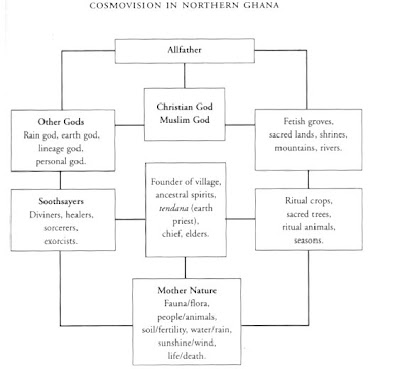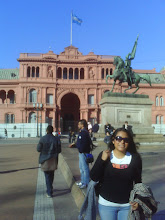- Land was an ancestral trust, committed to the living for the benefit of the whole community, in particular the unborn generations.
- African traditions best express their cosmovisions.
- When the focus is on 'The Triad', and the focus is on land as a common property, a common vocabulary and knowledge, and therefore a common culture, sweeps through Africa.
- The cosmovision notion originates from a culture which has a holistic worldview, integrating the world with the cosmos. Africa’s perspective of cosmovison --> the whole of nature is conceived as a living being, like an animal, with all parts interrelated and needing to perform.
- 1.- Cosmovision is a social construct that includes the assumed interrelationships between spirituality, nature and mankind. It describes the role of supernatural powers, the natural processes that take place and the relationship between mankind and nature.
- 2.- Cosmovisions often indicate a hierarchy in divine beings, spiritual beings (especially the ancestors), natural forces (such as climate, diseases, floods), soil, vegetation, animals, man and woman.

- The worldviews of traditional African societies --> influence of development interventions by Professor Kofi Asare Opuku in
* 'Traditional attitudes towards nature in Africa' [1993]
* 'The traditional foundations of development' [1989]. - Endogenous development. - working through indigenous structures and institutions.
- The people are governed by unwritten laws and regulations that are guided by history, posterity, and their spirituality.
- Their 'best option scenario'--> protracted efforts to resolve the problem - an endeavor they would continue with or without us.
* For them it is a question of survival and continuous existence within that environment.
* For us, it is one of plugging in and plugging out.

Woooow! Is interesting!
ResponderEliminarI think that traditional african views are very important to know their perpectives about the present and the past.
Tim Robinson, New Zealand
Wooow! Is very interesting!
ResponderEliminarI think that is very important to know about the past and the present about Africa.
The traditional are the key to know the African's countries!
Good Luck!
Tim, New Zeland